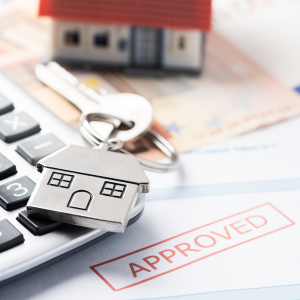
Nance Homebuyer helps you sell a house with a mortgage in Georgia, guiding you from paying off your loan to a smooth closing so that you can navigate the process confidently.
Understanding the Process of Selling a Mortgaged Property in Georgia
If you want to sell a house in Georgia’s real estate market that already has a mortgage, there are a few important things that homeowners need to know about to make the process go more smoothly. First, you need to know how much you still owe on your mortgage. You may get this information by calling your lender and asking for a payback statement.
This number will tell you how much of the sale price will go toward paying off the mortgage. Homeowners should then look at the current real estate market in Georgia to figure out a good asking price, one that covers the mortgage and any other expenditures of selling the home.
Working with a real estate professional who knows the ins and outs of Georgia’s market may be very helpful. They can give you information about local trends and help you sell the property well. When you negotiate, you need to think about closing expenses and any fees that can come up if you pay off your mortgage early.
Sellers can make smart choices during the transaction process if they understand how money works. Once an offer is accepted, working with both your lender and a closing attorney who knows Georgia’s laws will assist the closing go well and make sure that all legal duties are satisfied quickly.
Legal Requirements for Selling a House with an Existing Mortgage in Georgia
When selling a home with an existing mortgage in Georgia, it’s essential to grasp the legal requirements involved. Before proceeding, sellers should carefully examine their mortgage agreement to identify any clauses concerning prepayment penalties or terms for early payoff.
Obtaining a payoff statement from the lender is crucial, as it details the precise amount required to settle the mortgage at closing. Moreover, it’s important for homeowners to understand Georgia’s disclosure laws, which require sellers to share essential details regarding the property’s condition and any significant defects with prospective buyers.
Hiring a skilled real estate attorney can assist in understanding these legal responsibilities and guarantee adherence to state laws. It’s essential for sellers to work closely with their lender and title company to ensure a seamless title transfer, making sure that all existing liens are addressed.
Grasping these legal elements can simplify the journey of selling a home with a mortgage in Georgia’s real estate landscape.
Steps to Successfully Sell Your Home with a Mortgage in Georgia
There are a few important steps you need to take to make sure the sale of a house with a mortgage goes smoothly in Georgia’s real estate market. First, talk to your mortgage lender to find out how much you have to pay off. This is important for setting a fair selling price.
Working with an experienced real estate professional who knows how the Georgia market works can help you learn a lot about how to market your home and how much it’s worth in the area. Getting your house ready to sell by fixing up what needs fixing and making the outside look better can have a big effect on how many people want to buy it.
When deals come in, go over them carefully with your expert to make sure they cover the rest of your mortgage and fit with your financial goals. During talks, think about what could go wrong that could change the closing process or timeline.
When you accept an offer, work closely with your lender and title company to make sure the paperwork is taken care of and the mortgage is paid off at the closing. If you know these steps, you can speed up the selling process and get the most money for your home in Georgia’s tough real estate market.
Navigating Mortgage Payoff When Selling a House in Georgia

Understanding the mortgage payment process is essential if you want to sell your home for cash in Georgia. When you decide to proceed with the sale, your first step is to contact your mortgage lender and request a payoff quote, which will specify the total amount required to repay your mortgage loan.
This amount includes the remaining principal balance, accrued interest up to the payout date, plus any fees for early repayment or closing costs. In Georgia, sellers must carefully plan this procedure because fluctuating interest rates and potential prepayment penalties can have a significant impact on financial outcomes.
Working with a real estate professional who understands Georgia’s housing rules might simplify the transaction process. The expert can ensure that all required documents are properly prepared and submitted on time.
When selling a house with a mortgage in Georgia, it’s important to note that the proceeds will be utilized to pay off the existing loan before any leftover equity is delivered to the seller. This assures legal compliance while allowing for a smooth transition during the closing process.
Key Considerations for Homeowners Selling Mortgaged Properties in Georgia
When selling a home with a mortgage in Georgia’s real estate market, homeowners need to keep in mind several important factors to facilitate a seamless transaction. Initially, grasping the existing payoff amount on the mortgage is essential, as this will impact the financial aspects of the sale.
Homeowners are encouraged to obtain a payoff statement from their lender to assess the total amount owed and to identify any possible prepayment penalties. Engaging with a knowledgeable real estate professional who understands Georgia’s market trends and legal requirements is crucial. They can offer valuable insights on pricing strategies that are in tune with local conditions.
Sellers should also consider closing costs and their potential effect on net proceeds. Grasping these expenses is crucial for effective negotiation and establishing realistic profit margin expectations.
Homeowners are required to provide essential details regarding the property’s condition and any current liens to prevent potential legal issues down the line. Performing a title search at the outset helps to avoid any unexpected issues that might postpone or disrupt the sale.
By thoughtfully evaluating these elements, sellers in Georgia can enhance their chances for successful transactions, even when facing an existing mortgage balance on their property.
How to Prepare Your Mortgaged Home for Sale in the Georgia Real Estate Market

Getting a mortgaged home ready for sale in Georgia’s real estate market requires careful planning and execution to draw in potential buyers and facilitate a seamless transaction. Begin by grasping the mortgage payoff amount, as this will inform your pricing approach.
Evaluate the existing market landscape in Georgia, focusing on elements like neighborhood dynamics and similar property sales, to establish a compelling listing price. Boost your home’s visual appeal by keeping the landscaping tidy, refreshing the exterior paint when needed, and making sure the front entrance is welcoming.
Clear out unnecessary items and remove personal touches in every room to help potential buyers imagine themselves in the space. Think about undertaking small repairs or enhancements, like mending dripping faucets or swapping out old light fixtures, as these can boost your home’s value with minimal expense.
Engaging a skilled real estate professional familiar with Georgia’s market can offer essential insights into effective staging methods and marketing approaches designed to resonate with local buyers’ tastes. Furthermore, collect all essential paperwork concerning your mortgage and property disclosures to facilitate a smoother closing process once an offer is accepted.
Financial Implications of Selling a Home with an Outstanding Mortgage in Georgia
It is very important to know the financial effects of selling a home in Georgia that still has a debt on it. To find out how much they owe on their mortgage, homeowners must first call their lender and ask what the balance is, which includes the principal and any interest that has been added.
If you don’t want a short sale, which can hurt your credit score, the property must sell for enough to cover this amount. Not only should sellers think about the amount they need to pay off, but they should also think about the closing costs, the real estate professional’s fees, and any early payment fines that might be in their mortgage agreement.
To get an idea of the net profits from the sale, you should also think about the real estate market in Georgia and the property taxes. When sellers in Georgia’s real estate market already have a mortgage, knowing about these financial issues helps them make smart choices and makes the transaction process go more smoothly.
Selling a home with a mortgage means the proceeds must cover the loan balance and costs. At Nance Homebuyer, we buy houses in Atlanta and nearby areas, offering a fast, hassle-free solution.
Common Challenges and Solutions for Sellers with Mortgages in Georgia’s Housing Market

Navigating the process of selling a house with an existing mortgage in Georgia’s real estate market can be complex. However, recognizing these challenges can pave the way for practical solutions. A frequent challenge for sellers is figuring out the payoff amount of their mortgage, which can vary from the balance indicated on statements because of interest accumulation.
For sellers, reaching out to their lender for an accurate payoff quote is essential to prevent any unexpected issues at closing. One more hurdle is managing the property appraisal process and timeline before closing, since differences between the sale price and appraised value can create complications in transactions.
To address this, sellers ought to make sure their home is in top shape and think about obtaining a pre-listing appraisal or inspection. Moreover, sellers should be aware of possible prepayment penalties, as these can affect net proceeds if not considered in financial planning from the outset.
Working with an experienced real estate professional who is well-versed in the intricacies of Georgia’s housing market can simplify negotiations and paperwork, ensuring adherence to state regulations and making the transaction process more seamless. Grasping these challenges and taking proactive steps to tackle them enables sellers to handle timelines efficiently, reducing stress throughout the transition phase.
Calculating Equity: Understanding Your Financial Position Before Selling a Mortgaged Home in GA
If you want to sell a house with a mortgage in Georgia’s real estate market, you need to know how to figure out your equity. The difference between the current market value of your property and the amount you still owe on your mortgage is called equity.
To find out, get a professional appraisal or do a comparative market analysis to find out what your property is worth on the open market. Next, look at your mortgage statement to see how much you still owe on the loan.
To figure out how much equity you have in your property, take the appraised value and subtract the mortgage amount. This number is important since it affects how much money you could make from the sale and helps you set prices.
Also, knowing your equity can help you figure out how much closing costs will be, which could include expert commissions and taxes. This will help you know how much money you will get after the sale. Homeowners in Georgia’s fast-changing real estate market can make smart choices about selling their homes by carefully looking at these factors.
The Impact of Interest Rates on Selling Homes with Mortgages in the Georgian Market
In Georgia’s real estate market, interest rates are quite important when it comes to selling homes with mortgages. When interest rates are low, it is easier for people to get mortgages, which makes more people want to buy properties and could raise property values.
This situation can be good for sellers who still have a mortgage on their house, since they might get more competitive offers. On the other hand, when interest rates go up, borrowing costs go up, which can make it harder for people to buy homes and slow down the market.
If sellers need to change their pricing strategy because fewer purchasers are willing or able to pay higher mortgage payments, they may run into problems. Homeowners in Georgia who want to sell need to know about these changes because timing and how quickly they respond to changes in interest rates can have a big effect on how well a sale goes.
How Short Sales Work for Underwater Homes with Mortgages in Georgia
To go through a short sale in Georgia for a home that is underwater on its mortgage, you need to know a few important legal steps and things to keep in mind. People whose home’s value has dropped below their mortgage balance can choose a short sale instead of default.
For this process to work, the lender has to agree to take a payoff amount that is less than what is owed on the mortgage. The homeowner usually has to show that they are having a hard time paying their bills to be eligible.
Once the lender agrees to the terms of the short sale in Georgia, the house can be put on the market at a price that will attract buyers quickly. During this process, buyers need to work closely with real estate professionals and lawyers who are experienced and who know Georgia’s specific rules and paperwork needs for short sales.
A short sale can help homeowners get out from under their underwater mortgage debt while doing less damage to their credit scores than going through the foreclosure process.
What Happens If You Sell a House Before Paying Off the Mortgage?
When selling a home before paying off the mortgage in Georgia’s real estate market, several crucial measures and considerations must be taken. First and foremost, understanding your mortgage payoff amount is critical, since it indicates the outstanding total owed to your lender.
When you sell your house, the earnings are normally used to pay off your outstanding mortgage obligation. With Georgia, as with many other jurisdictions, the closing process includes dealing with a real estate attorney or title business to ensure that all legal and financial requirements are completed.
If your house’s sale price exceeds the mortgage balance and associated selling charges, you can keep the difference as profit. However, if your property sells for less than the mortgage balance, known as “underwater,” you may need to arrange a short sale with your lender or bring additional funds to cover the deficit.
If you pay off your mortgage early, then you should also consider any prepayment penalties that may apply. Consulting with a real estate professional who is familiar with the Georgia market can provide useful direction throughout this process, ensuring that all contractual and legal obligations are met when selling a home with an existing mortgage.
When you sell a house, you use the proceeds to pay off the mortgage and keep the remaining amount. If you owe more than the sale price, you pay the difference. For more help, Contact Us at Nance Homebuyer.
How Does a Mortgage Work for the Seller?
It is very important for people in Georgia who are selling a house with a mortgage to understand how the mortgage works. These days, when you sell your house, the money you get will probably be used to pay off your mortgage.
First, call your lender and ask for a payoff account. This will show you exactly how much you owe, along with any fees or interest that may have been added. In Georgia, it’s important to know that a lot of mortgages have a clause that says the full amount is due when the house is sold.
As the seller, you’ll need to work closely with a real estate professional who knows Georgia’s rules to make sure that all of your legal and financial responsibilities are met quickly. It’s also important to know how equity affects your sale. Equity is the difference between how much your home is worth on the market and how much you still owe on your mortgage.
If you have positive equity, you might make money after paying off your bills and closing costs. But if you have negative equity, which means you owe more on your home than it’s worth, you may need to negotiate with your lenders or think about short sales.
By knowing these things, sellers can better manage Georgia’s real estate market and keep up with their mortgage payments during the transaction process.
Ready to sell your home, but don’t want the headaches? Nance Homebuyer specializes in quick, hassle-free sales. We provide competitive cash offers, manage every detail, and ensure a seamless process from start to finish. Contact us today at +17707582729 for a no-obligation offer and to take the first step toward a smooth sale.
| FIRST MORTGAGE | STAKE | OPTIONS | FORECLOSURE SALE | FORECLOSES | MONEY |
| REFINANCE | CASH | PRIVACY | PREPAYMENT PENALTY | FINANCIAL INVESTMENT | FIRST LIEN |
| DATA | TERMS OF USE | VALUATION | MESSAGE | HELOC | HOME EQUITY LINE OF CREDIT |
| FREQUENCY | ESCROW AGENT | ESCROW | DOWN PAYMENT | DEFICIENCY JUDGMENTS | DEED |
| BLOG | U.S. | REAL ESTATE TRANSACTIONS | REAL ESTATE INVESTOR | HOME OWNER | LINE OF CREDIT |
| INVESTOR | HOME EQUITY LOAN | FINANCE | BANK | EQUITY YOU HAVE | |
| PAY OFF YOUR MORTGAGE | YOUR REMAINING LOAN BALANCE | EQUITY YOU HAVE IN |
Helpful Georgia Blog Articles
- Fixing Up a House to Sell in Georgia
- Selling Your House with Tenants in Georgia
- Selling a House During Divorce in Georgia
- How to Sell a House Without a Realtor in Georgia
- Does a Seller Pay Closing Costs in Georgia?
- Capital Gains Tax After Selling a House in Georgia
- I Inherited a House in Georgia Now What?
- Selling Shares of Your Home in Georgia
- How Long to Live in a House Before Selling in Georgia
- How To Sell A House With A Mortgage In Georgia

